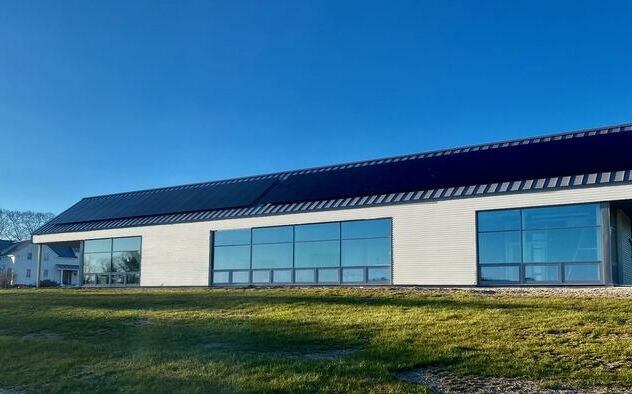State awards $2M to clean energy workforce training programs across Maine
 Photo / COURTESY, WOLFE’S NECK
The state identified passive house construction as a workforce training opportunity. Seen here is the Smith Center, located in Freeport and built to passive house standards.
Photo / COURTESY, WOLFE’S NECK
The state identified passive house construction as a workforce training opportunity. Seen here is the Smith Center, located in Freeport and built to passive house standards.
When the Wolfe’s Neck Center for Agriculture & the Environment in Freeport unveiled its Smith Center for Education & Research last year, it was a showcase of passive house construction designed to be free of fossil fuel use.
Passive house construction has gone from niche to mainstream in recent years.
But with that growth comes the need for workforce training of workers in the energy efficiency industry and traditional building trades.
With those goals, the Governor’s Energy Office this week announced a $200,377 grant award to PassivhausMaine in Freeport, to expand its low-cost, one-day energy code training program. It aims to educate up to 220 builders on Maine’s Uniform Building and Energy Codes and best practices in high-performance construction for northern climates.
The project will provide upskilling opportunities for current workers while also welcoming those new to the trades and prioritizing trainee from rural communities and underrepresented populations.
The award was one of six made to new and expanded training programs across the state and aiming to support and prepare hundreds of Maine people for careers in the state’s rapidly growing clean energy sector.
In all, the office awarded $2 million in grants to organizations in Biddeford, Portland, Freeport, Augusta, Orono and Oxford Hills.
“New clean energy projects are cutting energy costs, reducing harmful emissions and creating good paying jobs for Maine people,” said Gov. Janet Mills.
In addition to PassivHausMaine, other programs selected for awards were:
- Biddeford School Department and Biddeford Adult Education: $299,690 to develop curriculum, fund internships and apprenticeships, and provide job application and other support to prepare 70 individuals for careers in the clean energy and energy efficiency sectors. The program will recruit students from Biddeford, Saco, Old Orchard Beach and Sanford, with a focus on new Mainers who face barriers to accessing training programs and employment opportunities.
- Maine Math & Science Alliance (Augusta): $495,368 to implement the High School Rural Energy Futures Program that connects 500 rural high school students with clean energy and energy efficiency careers. The program includes professional development for 20 teachers, development of in-school learning modules with energy data and conversations, and a leadership program that will provide mentorship from industry experts.
- Oxford Hills and Nezinscot Adult Education: $214,191 to create a new local workforce program with training for 10 area adults and technical high school students to prepare them for careers in installation, maintenance and repair of heat pumps and solar panels. The training will strengthen existing Oxford Hills Technical School programming with a new curriculum designed to build skills in basic construction and electricity, thermal science, refrigeration and alternative energy.
- Portland Adult Education: $416,179 to expand its renewable energy pre-apprenticeship program by adding heat pump and thermal-focused pre-apprenticeship and bridge programs to prepare up to 150 individuals for careers in clean energy including solar energy, heat pump technology, green construction and home performance. The program is designed for individuals experiencing challenges entering the U.S. workforce and training programs, with a focus on non-native English speakers who are unemployed or underemployed, women, and other underrepresented groups.
- University of Maine (Orono): $374,193 to establish graduate and undergraduate certificate programs in building science analysis and design for 200 students and working professionals. Undergraduate students from engineering, engineering technology, forestry, sustainable materials and technology and other fields will take new courses and complete hands-on projects to prepare them for careers working with efficient and sustainable buildings. Working professionals and graduate students will have access to a new online certificate program in building science.
“Advancing our clean energy education, entrepreneurship and training will further position the Maine labor force to advance within a growing economic sector,” said Patrick Woodcock, Maine State Chamber of Commerce’s president and CEO.
“The Maine State Chamber of Commerce is particularly encouraged with the funding dedicated to the Rural Energy Futures Program that connects high school students with Maine businesses leading in the energy sector and exposing a generation of students to Maine careers.”
The number of clean energy jobs in Maine has surpassed 15,000, increasing faster in Maine than any other New England state, and the clean energy sector grew to contribute $2.31 billion to Maine’s economy in 2022, according to a report released earlier this year by the Governor's Energy Office.









0 Comments